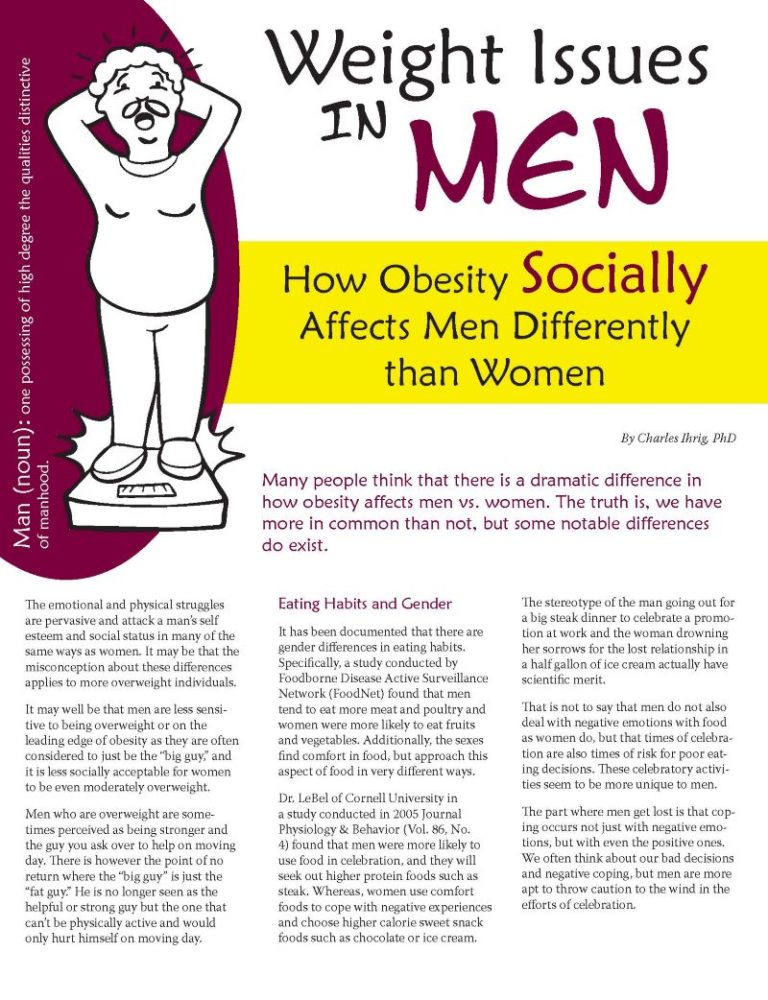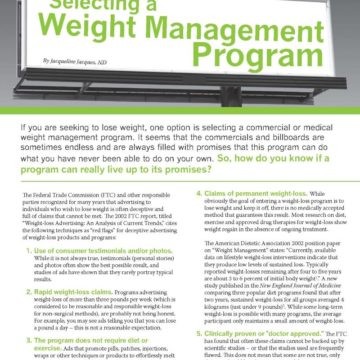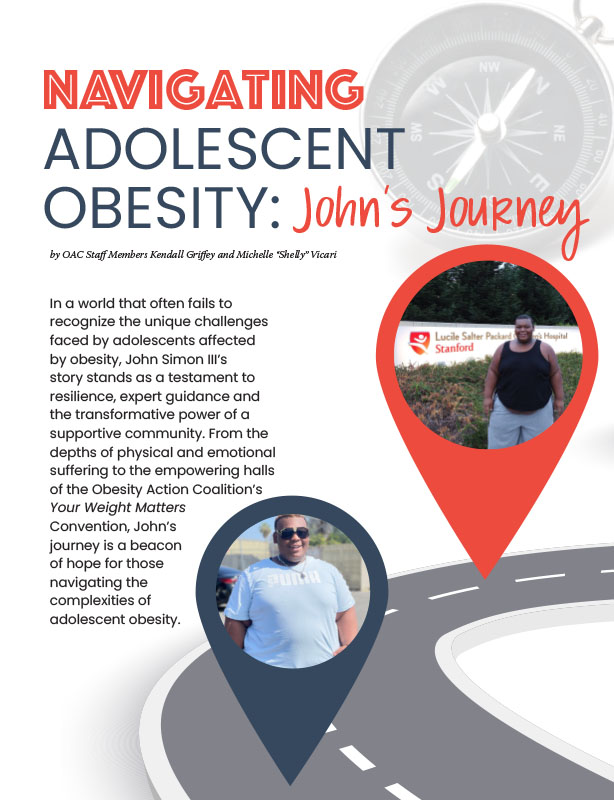Weight Issues in Men: How Obesity Socially Affects Men Differently than Women


by Charles Ihrig, PhD
Fall 2009
Many people think that there is a dramatic difference in how obesity affects men vs. women. The truth is, we have more in common than not, but some notable differences do exist.
The emotional and physical struggles are pervasive and attack a man’s self esteem and social status in many of the same ways as women. It may be that the misconception about these differences applies to more overweight individuals.
It may well be that men are less sensitive to being overweight or on the leading edge of obesity as they are often considered to just be the “big guy,” and it is less socially acceptable for women to be even moderately overweight.
Men who are overweight are sometimes perceived as being stronger and the guy you ask over to help on moving day. There is however the point of no return where the “big guy” is just the “fat guy.” He is no longer seen as the helpful or strong guy but the one that can’t be physically active and would only hurt himself on moving day.
Eating Habits and Gender
It has been documented that there are gender differences in eating habits. Specifically, a study conducted by Foodborne Disease Active Surveillance Network (FoodNet) found that men tend to eat more meat and poultry and women were more likely to eat fruits and vegetables. Additionally, the sexes find comfort in food, but approach this aspect of food in very different ways.
Dr. LeBel of Cornell University in a study conducted in 2005 Journal Physiology & Behavior (Vol. 86, No. 4) found that men were more likely to use food in celebration, and they will seek out higher protein foods such as steak. Whereas, women use comfort foods to cope with negative experiences and choose higher calorie sweet snack foods such as chocolate or ice cream.
The stereotype of the man going out for a big steak dinner to celebrate a promotion at work and the woman drowning her sorrows for the lost relationship in a half gallon of ice cream actually have scientific merit.
That is not to say that men do not also deal with negative emotions with food as women do, but that times of celebration are also times of risk for poor eating decisions. These celebratory activities seem to be more unique to men.
The part where men get lost is that coping occurs not just with negative emotions, but with even the positive ones. We often think about our bad decisions and negative coping, but men are more apt to throw caution to the wind in the efforts of celebration.
Weight Gain and Gender
These differences may well play into how men and women deal with weight gain. There has been a distinct appeal to low carbohydrate approaches to men as they get to keep some of their favorite celebratory foods and are not resigned to salads and raw vegetables. Whereas women may be more likely to struggle with such approaches; or the recommended “protein first” approach to the post-operative diet plans.
Men differ greatly in how they deal with their vanity. Don’t fool yourself – even the most manly of men can be vain. Whether it is coloring our gray or replacing our missing hairs, we want our youthful masculine appearance. Weight issues are no exception.
Men long for the six pack abs and gun show arms which will elude most of us. Some of us struggled with weight issues early in our childhood. The early experience left us scared of ridicule and social exclusion. Others mourn the loss of their physical abilities and looks with the addition of weight later in life.
Male Weight Issues
I have been leading aftercare support groups as part of my work. When starting my work there, we developed a men’s-only group, as men were often the minority in the existing support groups. It appeared as though the men wanted such a venue as they felt that there were significant differences in their experiences from women who had undergone gastric weight-loss surgeries.
The reality was that their experiences were not as different, but the issues that they wanted to work through were often not appropriate for the coed setting. It seems the weight kept the men from feeling as sexual and that many had given up on themselves. Their comfort in being out of any relationship or taking their relationship for granted had caught up with them.
Yes, I am letting the secret out that men are often more motivated to stay healthy to attract the opposite sex, but irony rears its ugly head. With increased weight comes decreased sex drive, not to mention decreased attractiveness.
Reduced sex drive is a prominent theme of the men’s groups; with this comes isolation. Later with their weight-loss well underway they are equally surprised by the return of sex drive and the confusion now how to handle this. With fragile self esteem damaged by weight and years of social isolation, this sex drive is often an unwelcome surprise.
Conclusion
In conclusion, men struggle emotionally, socially and physically with obesity just as women do, but there may be subtle differences in how that weight evolves and how they deal with the need to reduce the weight. Celebration, isolation, sexuality and self esteem all can be obstacles as well as incentives to men in their weight-loss efforts. A better insight into the individual’s reasons for eating and the consequences of their weight will lead to better weight-loss efforts and increased self esteem.
About the Author:
Charles Ihrig, PhD, is a licensed clinical psychologist and the owner and founder of Athena Consulting and Psychological Services, LLC. His company has been offering pre-surgical evaluations and follow-up psychotherapy for surgical groups in the middle Tennessee region for the last seven years.
by Nina Crowley, PhD, RD (with Inspiration from Shawn Cochran) Winter 2024 Dating, no matter your age,…
Read Articleby Leslie M. Golden, MD, MPH, ABOM Diplomate Winter 2024 The journey to overcoming obesity is a…
Read Articleby OAC Staff Members Kendall Griffey and Michelle “Shelly” Vicari Winter 2024 In a world that often…
Read Article









